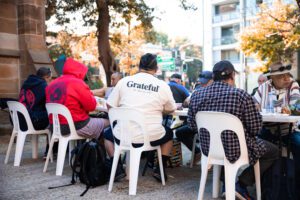About ten years ago I was invited to join Bread of Life, a program that serves breakfast every Sunday to people living rough in Sydney. I quickly mastered the art of pouring tea and coffee, buttering toast and using the commercial-sized dishwasher. Faces and names started becoming familiar and I cherished the moments of connection when someone would respond to my cheerful ‘Good morning’.
But I didn’t get to share the gospel even once. I didn’t get to tell people that God loved them. That Jesus died for them. Friendly conversations would more often than not become one-sided where I couldn’t get a word in. Each month, my 5:45am alarm would go off and I would question why I bothered. What was my motivation? And if I was going to build up my team, I needed to understand and articulate why I thought Bread of Life was a ministry worth doing.
What Are the Motivations for Good Deeds Ministry?
I searched for a simple, strong but theological argument for doing Bread of Life. I read Christian literature on social justice. I wanted something succinct, a catchy one-liner. But the only thing that became clear was the very tension I had been feeling, between word ministry and compassionate ministry. How can we tell someone the good news of Jesus but ignore the fact that they don’t know when their next meal might be? How can I share the gospel when conversations were clouded by pain and hurt? I struggled to bring together the instruction in the Bible to care for the poor and needy with the instruction to share the good news into a larger whole.
It was the book of Titus that gave me the motivation I was looking for: we have been saved to do good, to glorify God and so that others might see and be drawn to God, who offers salvation to all people.
For the grace of God has appeared that offers salvation to all people. It teaches us to say “No” to ungodliness and worldly passions, and to live self-controlled, upright and godly lives in this present age, while we wait for the blessed hope—the appearing of the glory of our great God and Saviour, Jesus Christ, who gave himself for us to redeem us from all wickedness and to purify for himself a people that are his very own, eager to do what is good. (Titus 2:11–14)
The Grace of God Offers Salvation to All People
We are all undeserving of his grace, but Jesus died and rose again for us. Salvation is not only for those who are well-off, educated, easy-to-love. Titus chapter 3 describes us all as “foolish, disobedient, deceived and enslaved by all kinds of passions and pleasures. It was only when “when the kindness and love of God our Savior appeared [that] he saved us, not because of righteous things we had done, but because of his mercy” (verses 3–5).
We are quick to accept that our Saviour loves those close to us—our friends and family. But he also loves those less familiar to us; the man sleeping on cardboard on the sidewalk, the woman standing on the corner selling copies of The Big Issue. We may walk past or avert our eyes, but God sees them. God loves them. God wants them to know him.
The name ‘Bread of Life’ was chosen to highlight our desire not just to provide physical food, but to share eternal food in the gospel. We want those involved to know that we love and serve because of God’s grace to us and that nothing is better or more important than the gift of salvation through Jesus, the Bread of Life.
We Have Been Saved to Do Good
The apostle Paul reminds us that we have been saved in order to do good (Tit 2:14). The eagerness to relate to others in love is born from the fact that God first loved us.

We have plenty of opportunities to show love in both words and actions. For people living rough, we can love practically by providing food or shelter. We call those who come for breakfast at Br
ead of Life ‘companions’. The program becomes not just food service, but a time of fellowship for a marginalised group of people, who are often treated poorly or even ignored. Our volunteers
and companions work together to set up the tables, prepare breakfast and have a laugh together over a game of table tennis. As companions line up to receive breakfast, the thank yous are not only for serving, but for simply being there. Through food service and fellowship over a meal, we share together and show people who are doing it tough that they are cared for. We get to catch up about what’s been happening since we last saw each other and hear how life is going. It is a joy to see the love between volunteers and companions and know that it comes from a God who first loved us.
Doing Good Shines a Light and Gives Glory to God
We’re not called to do good only for the sake of doing good. Titus chapter 2 verses 5 and 10 also talk about making the teaching about God our Saviour attractive. Our lives are a testament to the good life that Jesus offers. In doing good, we are allowing others to see how the word of God has an impact on our lives.
A colleague of mine mentioned he had heard about Bread of Life and a church that was doing some ‘good things in the community’ and not just being inward focussed. In addition to serving companions, Bread of Life provides an opportunity for followers of Jesus to work together and alongside others who may not know Jesus, sharing and showing how the gospel motivates us. Over the years, I’ve heard team members ask each other questions and share their stories about what knowing Jesus means to them; I’ve seen relationships being built and I’ve seen us work together to serve others in need. The joy of serving for the Lord’s sake comes from the joy of knowing that our salvation isn’t earned but was freely given to us through Jesus.
Why Do I Do Bread of Life?
My deep dive into the theology of good deeds helped clarify my involvement with Bread of Life. Now, when people ask why I do Bread of Life I have a clearer answer: we’ve been called to do good and to love others. God has shown me the good life in Jesus, the wonderful message of salvation that urges us to share God’s love however we can. Bread of Life is an opportunity to love people who are marginalised and overlooked; and in doing so, we make the teaching about Jesus attractive and bring glory to God. I shouldn’t feel dejected when I walk away without a single gospel conversation. On the Sundays when my alarm goes off at 5:45am and it’s pitch black and pouring down with rain, I am motivated by the love of our Saviour who wants people to see and know him.
















